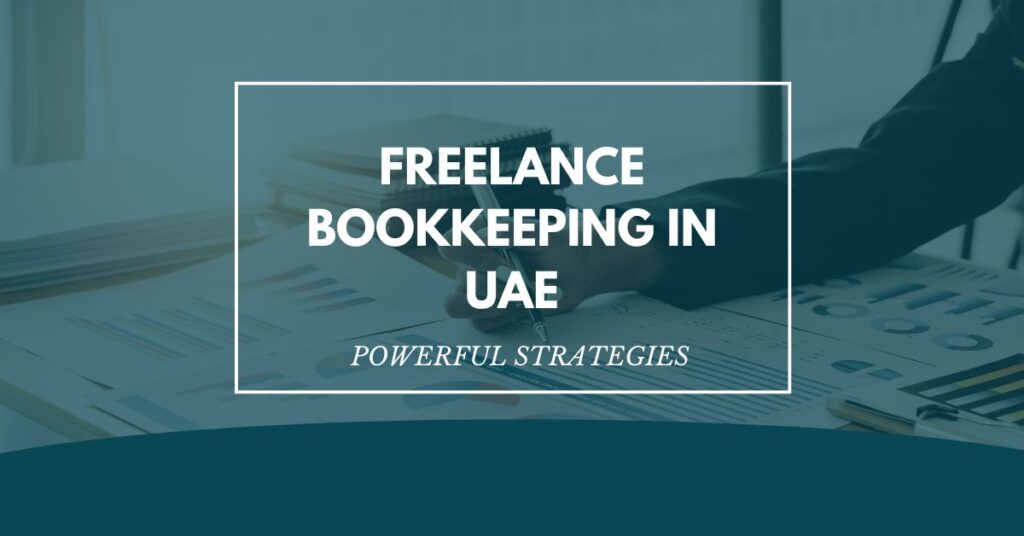?Introduction: Why Organized Bookkeeping is Essential for Freelancers in the UAE
Freelancing in the UAE is an exciting venture that offers autonomy, flexibility, and the ability to work on diverse projects. However, freelance bookkeeping can be a daunting task for many, especially with the increasing complexity of tax laws and financial regulations. Without an organized system, managing income, expenses, and tax obligations becomes overwhelming, potentially affecting your business’s growth.
Having an efficient freelance bookkeeping strategy in place is crucial for staying on top of your finances. It ensures that you can properly track your cash flow, remain compliant with tax laws, and maintain a clear financial overview. In this article, we’ll share actionable freelancer bookkeeping tips that will help you streamline your financial processes and avoid costly mistakes.
1. ? Understanding the Importance of Bookkeeping for Freelancers in the UAE
Freelancers in the UAE often juggle multiple projects, which means there’s a constant flow of payments and expenses. Freelance bookkeeping helps you manage this flow by keeping track of all financial transactions, allowing you to make informed business decisions.
- Why Bookkeeping Matters: Proper bookkeeping enables you to understand your income and expenses better. It provides insights into profitability and potential areas of growth. For freelancers in UAE, bookkeeping is not just about compliance; it’s about gaining a clear picture of your financial health.
- Legal and Tax Compliance: Freelance bookkeeping ensures that all financial records are up-to-date and in compliance with local tax regulations. Failing to maintain accurate records can result in penalties, fines, or tax-related issues. Staying organized also makes tax filing easier, saving time during tax season.
2. ? Key Elements of Organized Bookkeeping for Freelancers
Effective freelance bookkeeping requires tracking both income and expenses. This can be done through a mix of manual methods or accounting software. Let’s explore the essential components:
- Income and Expenses Tracking: Whether you are a freelancer offering services or selling products, it’s crucial to keep accurate records of your incoming payments and outgoing expenses. For freelancers, bookkeeping is more than just tracking sales; it’s about organizing every cost, from materials to travel expenses.
- Invoices and Receipts: Every financial transaction needs to be backed up by a receipt or invoice. This practice not only ensures your records are accurate but also helps you avoid missing out on tax deductions.
3. ? Choosing the Right Tools for Freelance Bookkeeping
When it comes to freelance bookkeeping in UAE, the right tools can make all the difference. Here are a few options:
- Accounting Software: Platforms like QuickBooks, FreshBooks, and Xero simplify bookkeeping for freelancers. These tools automate many tasks, reducing errors and helping freelancers stay organized.
- Manual vs. Automated Bookkeeping: While manual bookkeeping can work, it’s often time-consuming and prone to errors. Automation through software significantly enhances accuracy and saves time.
- Cloud-Based Solutions: For freelancers in UAE who travel frequently or work remotely, cloud-based tools offer the advantage of accessing your financial data from any location.

4. ? Best Practices for Freelancers to Stay Organized
A freelance bookkeeping in UAE system requires consistency. Here are some habits and best practices that will help you stay on top of your finances:
- Set Up a Dedicated Bank Account: Mixing personal and business finances can lead to confusion, errors, and missed deductions. A separate business account for your freelance work makes tracking finances easier and more accurate.
- Create a Regular Schedule for Bookkeeping: Establish a routine for updating your financial records. Whether it’s daily or weekly, consistent bookkeeping will help you avoid a backlog and reduce stress during tax season.
- Use Categories for Income and Expenses: Categorize your income and expenses into specific categories (e.g., office supplies, travel, marketing) to help you track where your money is going.
5. ? Tax Considerations for Freelancers in UAE
Understanding tax regulations is a critical part of freelance bookkeeping in the UAE. Here’s what freelancers need to know:
- VAT for Freelancers in UAE: If your annual income exceeds a certain threshold, you’ll need to register for VAT. You should track your VAT payments and refunds diligently to avoid any errors during filing.
- Tax Filing Deadlines: Freelance bookkeeping in UAE is not just about tracking income and expenses—it also involves staying informed about tax deadlines. Missing these deadlines can result in penalties.
- Tax Deductions for Freelancers: Freelancers can deduct various business expenses from their taxable income. This can include office supplies, software subscriptions, and even some travel expenses. A well-organized bookkeeping system ensures you don’t miss out on these deductions.

6. ? Hiring an Accountant vs. DIY Bookkeeping for Freelancers
When it comes to freelance bookkeeping in the UAE, some freelancers prefer handling their finances on their own, while others hire professionals. Here’s a breakdown:
- When to Hire a Professional: If your freelance business is growing, it might be worth hiring an accountant to help with more complex financial matters. An accountant can also assist with tax filing and ensure that your bookkeeping practices are compliant with UAE laws.
- Benefits of DIY Bookkeeping: DIY bookkeeping can be cost-effective, especially when you’re starting out. It’s also a great way to learn about the financial aspects of your freelance business.
- Outsourcing Bookkeeping: If you’re too busy or simply prefer to focus on your projects, outsourcing your bookkeeping can be a good option. There are several freelance bookkeepers in the UAE who specialize in helping freelancers with their financial management.
7. ⚠️ Common Bookkeeping Mistakes Freelancers Make
Many freelancers make common mistakes when managing their finances. These errors can cause significant problems down the road:
- Failure to Separate Personal and Business Finances: Blurring the lines between personal and business finances can lead to accounting confusion. Freelance bookkeeping in UAE should always be kept separate to maintain clarity and avoid tax complications.
- Neglecting to Track Receipts and Invoices: Not keeping track of receipts or invoices can lead to missed deductions or inaccurate financial records. Organize your receipts as soon as possible.
- Ignoring Software and Automation: Avoid sticking to outdated methods like spreadsheets when there are excellent accounting software solutions available. These tools streamline freelance bookkeeping in the UAE, making it more accurate and less time-consuming.
8. ? How to Use Financial Reports to Make Better Business Decisions
Your financial reports provide valuable insight into your business’s performance. Here’s how to use them effectively:
- Profit and Loss Statement: This report summarizes your income, expenses, and profitability. Understanding this statement will help you assess the financial health of your freelance business.
- Balance Sheet: Your balance sheet reveals your business’s assets, liabilities, and equity. This document helps you see where your money is tied up and how much debt you owe.
- Cash Flow Management: Freelancers often face cash flow issues. By closely monitoring your cash flow, you can ensure that you have enough funds to cover operating costs and avoid late payments.

9. ? How to Prepare for Tax Season as a Freelancer in UAE
Tax season can be stressful, but with the right preparation, you can make it easier:
- What to Prepare for Tax Filing: Gather all receipts, invoices, and financial statements. Having everything organized will make the process much smoother and faster.
- Avoiding Common Tax Pitfalls: Freelancers often miss deductions or fail to declare all their income. Proper bookkeeping helps you avoid such mistakes.
- Hiring a Tax Professional: If you’re unsure about tax regulations, consider consulting a tax professional who can help you navigate the complexities of tax filing for freelancers in UAE.
10. ? Staying Organized and Up-to-Date with Financial Regulations in UAE
It’s important to stay informed about the latest financial regulations:
- Keep Abreast of Changing Tax Laws: The UAE tax landscape is always evolving, and staying up-to-date will help you maintain compliance.
- Staying Informed on Freelance Visa Regulations: Your visa status is often tied to your financial records. Ensure your visa remains valid by staying on top of the latest regulations.
- Government Resources for Freelancers in UAE: The UAE government provides many resources to help freelancers manage their businesses, including financial resources, tax guidelines, and visa requirements.
? Conclusion: Mastering Freelance Bookkeeping in UAE in 2025
In conclusion, maintaining organized bookkeeping is a fundamental part of freelancing in the UAE. With the rapidly evolving economic landscape in 2025, freelancers must embrace modern tools, effective practices, and consistent financial habits to ensure smooth operations. Freelance bookkeeping is not just about tracking income and expenses; it’s about setting yourself up for long-term success, minimizing tax risks, and empowering financial growth.
To thrive in the UAE as a freelancer, mastering your freelance bookkeeping system is essential. With the right knowledge and tools, you can efficiently manage your finances, save time, and focus on expanding your freelance career. Utilizing cloud-based solutions, keeping accurate records, and staying updated with UAE tax regulations are just a few of the steps that will put you ahead.
As you implement these freelance bookkeeping strategies, remember that consistent effort and organization will provide financial clarity and help you achieve your freelance goals. Moreover, staying proactive with your bookkeeping means that you can make better financial decisions, reduce the risk of errors, and ensure compliance with UAE’s business regulations.
In 2025, the UAE will offer a dynamic and diverse freelance market that demands high levels of financial responsibility. Freelancers who prioritize bookkeeping will be well-positioned to unlock the full potential of their business. Whether you’re just starting or are a seasoned freelancer, proper freelance bookkeeping will help pave the way for your success. So, start today and embrace these practices to build a sustainable and prosperous freelance future in the UAE.
External Links for Further Reading
- UAE Government’s Freelance Regulations
- UAE VAT for Freelancers
- QuickBooks for Freelancers
- Xero Bookkeeping for Freelancers
- Freelancers UAE – How to File Taxes
Also Read: Freelancing Vs. Traditional Jobs: Which is Better in the UAE?

